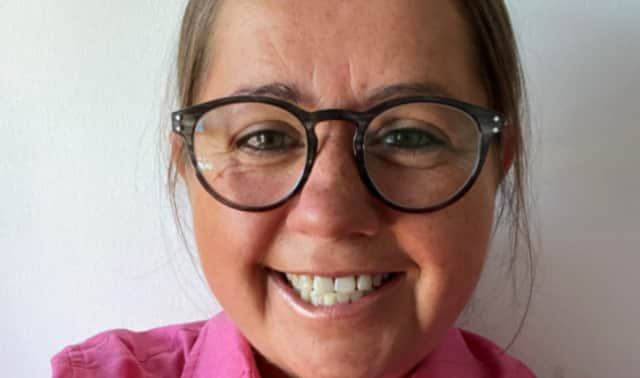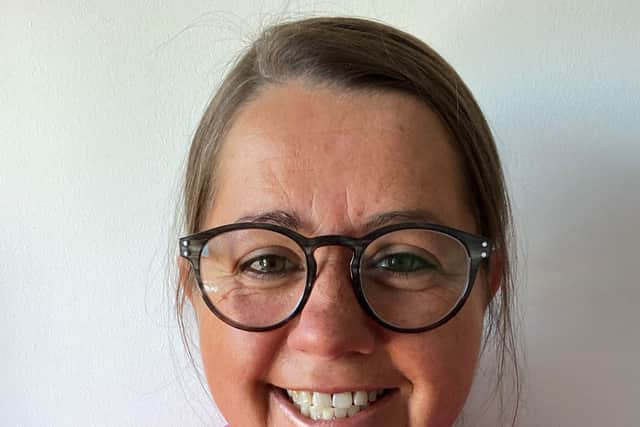NHS employee on how she turned ADHD ‘quirks into strengths after diagnosis at 40


A Northumberland NHS worker has shared her experience of being diagnosed with Attention Deficit Hyperactivity Disorder (ADHD) at the age of 40.
Victoria Wilson, a Peer Support Facilitator at the Tyne and Wear NHS Foundation Trust, is speaking out this ADHD Awareness Month in the hope of changing perceptions about what it means to have ADHD.
Advertisement
Hide AdAdvertisement
Hide AdHaving received her diagnosis later in life, Victoria recalled always having felt "like my brain was wired differently!.
As she grew up, that manifested itself more physically and Victoria suffered from chronic stress, turning to what she described as "unhealthy coping strategies".
She said: "My energy was being depleted by covering up my quirks, behaviours, and feelings.
"Essentially, I was masking who I was so I could fit into a world which is neurotypical.
Advertisement
Hide AdAdvertisement
Hide Ad"The effect on my self-esteem and confidence was damaging to my wellbeing, as I internalised the challenges in all aspects of my life.
“As a young person I was given many labels: forgetful, chaotic, energetic, messy, loud, disorganised, lazy, hypersensitive, impulsive, messy, a chatterbox, and a daydreamer.
"Some of these labels still affect me now. Yet these words have enabled me to understand who I am. Growing up in the 1980s, ADHD was not routinely explored in schools, and even less so in girls. Did anyone ever think about it or talk about it?"
Victoria eventually turned to counselling and then a GP who requested a referral for an assessment.
Advertisement
Hide AdAdvertisement
Hide AdThis took place during the Covid-19 pandemic, meaning appointments were online and, after the assessment process, Victoria was diagnosed with combined ADHD.
She said: "I had probably known for many years that I had ADHD, but I was conditioned by stigma and society’s misunderstanding to the extent where I completely shut it out.
"Receiving a diagnosis helped me make sense of my constant overwhelm and what followed were stages of grief, anger and sadness thinking about my younger self."
ADHD is a neurodevelopmental disorder in which the brain grows differently, lacking action from specific chemicals involved in pleasure and reward.
Advertisement
Hide AdAdvertisement
Hide AdBrains with ADHD often search for ways to stimulate these chemicals which is why people can experience inattentiveness, hyperactivity and impulsivity that can make tasks including concentration and organisation difficult to manage.
Victoria is determined to show that these can also be turned into strengths.
She said: “My ADHD ‘quirks’, which were once my flaws, are actually parts of me I’m learning to build on, and I’ve written a list to help remind me of that...
"Compassion: We can experience intense emotions – good along with the bad – which makes us incredibly caring, affectionate, and empathetic. We ooze compassion towards others who are struggling.
Advertisement
Hide AdAdvertisement
Hide Ad"Divergent thinkers: We are adaptable, which enables us with the ability to wipe the slate clean and start again. We push past setbacks, adapt to new ideas, and move forward, always seeing the light at the end of the tunnel.


"Multitasking: We can do three or four things at once. The stimulation makes us thrive and we are far more productive when doing multiple things at once. If we enjoy the task, we will give it our full attention or ‘hyper focus’.
"Super intuitive: We can identify what others are feeling, often before they feel it themselves, picking up on sight, sounds, tastes, smells, and touch that other people may miss. We are natural problem solvers.
"Honest and have a strong sense of fairness: We can tune into people’s needs, we know what it is like to struggle and we want to help whoever we can. You’re always guaranteed a good honest opinion!
Advertisement
Hide AdAdvertisement
Hide Ad"Super in a crisis: We can struggle with anxiety in the slow times, but we thrive in chaos, so when things go ‘crash bang wallop’, within a catastrophe, a crisis, or something exciting, our brain clicks into gear and we dive in head-first.
"Enthusiastic energy: We are impulsive, which brings adventure, spontaneity, and an endless amount of energy. Some may describe us as energizer bunnies; we keep going and going and going…
"Flexible thinkers: We often think outside the box and are persistent. We do what needs to be done to get an important task accomplished and work well under pressure with an ability to think on our feet.
"Zest for life: We can radiate vitality, enthusiasm, and optimism. We have faced difficulties and overcome them and we tend to look on the bright side of life even when it’s not all rainbows and sunshine.
Advertisement
Hide AdAdvertisement
Hide Ad"Perseverance: We may have had to work twice as hard as our neurotypical peers, but our struggles have built a deep determination to try, and try again until we succeed."
It's now been a year since Victoria's diagnosis and she has now joined the Patient and Carer Involvement Team at the Tyne and Wear NH Foundation Trust.
She says her new role as a Development Wellbeing Facilitator "empowers me to use my newfound strengths confidently, enabling me to be totally and uniquely me.”
Comment Guidelines
National World encourages reader discussion on our stories. User feedback, insights and back-and-forth exchanges add a rich layer of context to reporting. Please review our Community Guidelines before commenting.